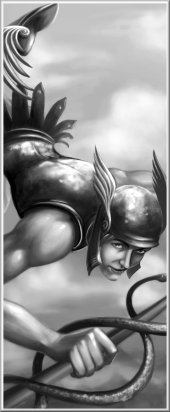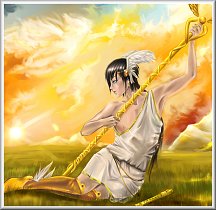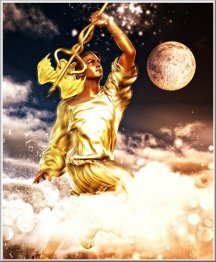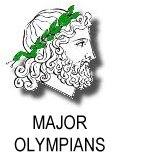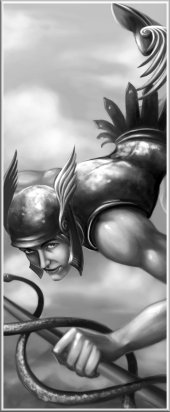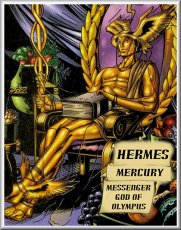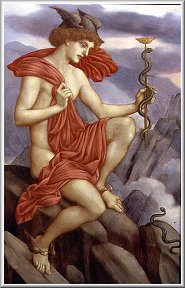MYTH MAN'S AWARD-WINNING HOMEWORK HELP
CLEVER HERMES, MESSENGER GOD
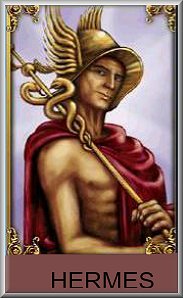
LATIN - MERCURY, MERCURIUS
PRINCIPAL SYMBOLS
AND ATTRIBUTES
He is the fastest of the gods, and his position was as messenger to Zeus and all the other gods. He was also the Divine Herald, the solemn guide who knew the road to hell and would lead the souls of the dead down to the Underworld, after Thanatos (Death) did his job. That's why he was also called Psychopompus, a name given to him for being the guide of souls to the Underworld.
Hermes is also the Greek god of Commerce and the Market, and thus the patron of traders, merchants and thieves. His distinguishing qualities were cunning, ingenuity, knowledge and creativity.
His realm included Gymnastics; he was the patron of all gymnastic games in Greece, and gymnasia were under his protection. The Greek artists derived their ideal of the god from the gymnasium and thus they represented Hermes as a handsome youth with beautiful limbs harmoniously developed by athletic exercises and gymnastic excellence.
Believed to be the inventor of sacrifices, Hermes was the protector of sacrificial animals. He is often mentioned in connection with Pan and the Nymphs, who were spirits of nature, and the shepherds worshipped him.
This versatile god had a hand even in administering Good Luck, presiding over games of chance such as dice. He was also the shrewdest and most cunning of all the gods, the master thief who began his career before he was one day old, by stealing Apollo’s herds.
A few hours after his birth the mischievous infant escaped from his cradle and traveled to Pieria, where he saw the splendid herds of Apollo and decided to take them. Carrying off some of the finest of his half-brother's renowned cattle, the infant Hermes returned to his native Arcadia.
The cunning child made the cattle walk backwards to obscure their tracks! He bribed a man named Battus, who had seen him, to be silent. Sacrificing two of the stolen animals, he divided them into twelve parts for the twelve great gods of Mount Olympus, hiding the rest of the herd.
It was this cheeky and brazen theft that won young Hermes recognition as a god himself.
Finding a tortoise outside his cave, Hermes further displayed his godly talent by placing strings across its shell, thus inventing the lyre. He sat there sweetly playing this marvelous new instrument, happy as a baby god could be. Meanwhile Apollo, using his prophetic powers (not to mention the fact that Battus did not keep his word, but had revealed the secret), had discovered the identity of the cattle thief and promptly arrived at Cyllene, confronting baby Hermes and charging him with the crime.
He said: "Child, lying in the cradle, make haste and tell me of my cattle, or we two will soon fall out angrily. For I will take and cast you into dusky Tartarus and awful hopeless darkness, and neither your mother nor your father shall free you." (Apollo to Hermes - Homeric Hymn to Hermes.)
The child's mother, Maia, was perplexed at Apollo's accusation of her son, and pointed out the infant snug in his cradle, innocently sleeping like a baby. There's no way such a sweet child could perpetrate the crime he was accused of, Maia said.
Apollo would have none of that, and he carried the baby to Zeus, who judged the infant guilty as charged and ruled that Hermes would have to return the stolen cattle to their rightful owner. But just then Hermes began to play on the lyre he had crafted, and Apollo was so charmed by the exquisite sound that the god of music allowed the child to keep the animals. Hermes in turn gifted the lyre to Apollo, and in no time the two were good friends.
Hermes, in his role as Messenger God, took part in many myths and was employed by all the gods, particularly Zeus, on a number of occasions. He was the one who:
-
Brought the goddesses Aphrodite, Hera and Athena to the shepherd Paris, who judged that Aphrodite was the most beautiful, causing the Trojan War.
-
Tied Ixion's hands and feet to the wheel, which is said to roll perpetually in the air.
-
Led the Trojan King Priam to the tent of Achilles to fetch the body of his dead son, Hector.
-
Gave Odysseus moly, the magic plant which offered protection against enchantment by a witch.
-
Gave the Golden-Fleeced ram to Nephele, in order to save her children.
-
Gave Hades' helmet of invisibility to the hero Perseus in order to help him slay Medusa.
-
Rescued from the flames baby Dionysus, god of wine, following his birth.
-
Brought back Zeus' sinews, which the monster Typhon had stolen, rendering Zeus helpless.
-
Freed the war god Ares from the bronze jar in which he had been imprisoned during the Olympians' battle versus the Giants.
-
During this same Giants revolt, Hermes, wearing Hades' helmet of invisibility, killed the giant Hippolytus
-
Sold the hero Heracles (Hercules) to Queen Omphale.
-
Rescued Io, one of Zeus' lovers, who had been transformed into a cow and was guarded by Argus, the 100-eyed giant. Hermes slew Argus and set Io free. Hermes is sometimes called Argiphontes, for having killed the All-seeing Argus
As the Herald of the gods,
Hermes was worshipped as the god of the roads, who protected travelers.
Many statues, called Hermae, were
erected on roads, and at doors and gates.
The Messenger god was also
the god of eloquence, since the heralds historically are the public
speakers in assemblies and on other occasions that require talking in
front of people.
Thus Hermes was also the god
of prudence and cunning, both in words and deeds, and even of fraud,
theft and perjury. His shrewd and creative character led many to claim
that he invented objects such as the lyre and syrinx, the alphabet,
astronomy, music, boxing, gymnastics, the cultivation of the olive tree,
measures, weights and many other things.
With Chione (or Philonis),
daughter of King Deadalion, Hermes had Autolycus, who was the
grandfather of Odysseus. Hermes gave his son the gift of being such a
skilful thief that he could not be caught, making him able to change
whatever he stole into some other form or color.
Some of his other children included:
-
Half-man/half-woman Hermaphroditus, from his union with Aprhodite
-
the Argonauts Aethalides, Echion and Eurytus
-
Abderus, Heracles' lover
-
Danae's grandfather Cephalus, from his union with Herse
-
With Herse's sister, Aglaurus, he had Ceryx
-
The phallic deity Priapus, with an unknown mother
-
the god Pan, according to some later poets.
-
With the nymph Sose he had Agreus, who was in Dionysus' retinue. Other offspring of Hermes in the service of Dionysus included Lycus, Nomius, Pherespondus and Pronomus
-
With Alcidamea he sired Bunus, who became King of Corinth
From Homer's Odyssey:
"Hermes, god of Cyllene, called the souls of the suitors to him. In his hand he held the beautiful golden wand which he used at will to close the eyes of humans or to waken them from sleep. With his wand he led the troop and the souls followed, emitting little squeaks. In the depths of the caves, bats flew away with little squeaks when one of them, hanging from a rock, lost his grip."
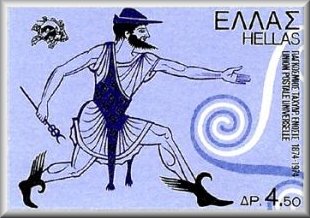
GREEK HERMES STAMP
HERMES WORSHIP
AND FESTIVALS

[HOME] [MYTHOLOGY'S EFFECTS ON
MODERN SOCIETY][OLYMPIANS]
[GALLERY] [MAJOR
GODS] [MINOR
GODS] [HEROES]
[CONTACT]
[LOVE STORIES]
[MYTH OF THE MONTH]
[FUN STUFF] [CREATURES]
